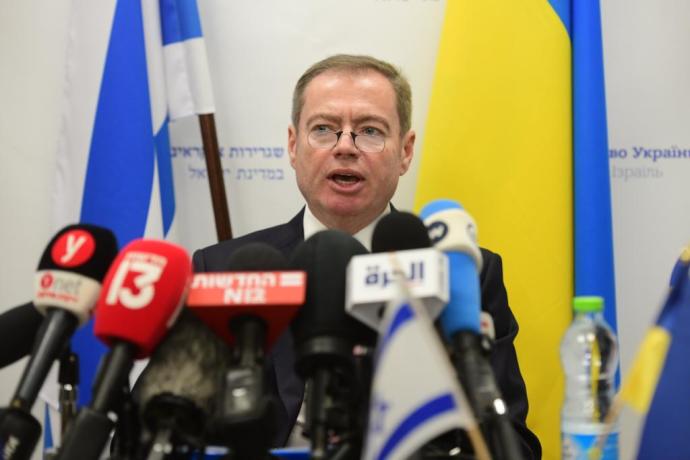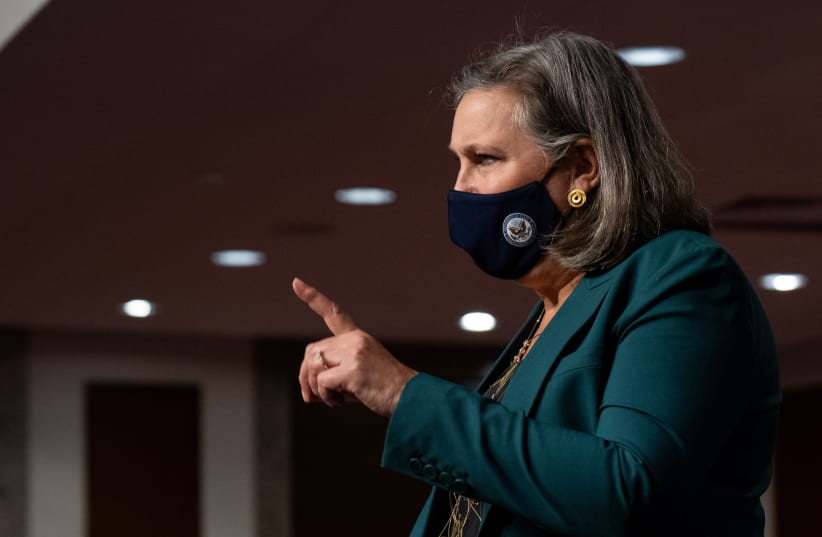The Biden administration and Ukraine have called on Israel to impose economic sanctions on Russia, with US Undersecretary of State for Political Affairs Victoria Nuland warning Jerusalem against being a haven for “dirty money.”
The US, Nuland told Channel 12 on Friday, is asking every “democracy around the world to join us in the financial and export control sanctions that we have put on [Russia].
“We have to squeeze the regime. We have to deny it the income that it needs,” Nuland said, adding that this includes squeezing the oligarchs around Russian President Vladimir Putin.
“In that context we are asking as many countries as we can to join us. We are asking that of Israel as well. Among other things, you [Israel] don’t want to become the last haven for dirty money that is fueling Putin's wars,” Nuland said.
Ukraine’s Ambassador to Israel Yevgen Korniychuk on Friday called on Israel to fully sanction Russia, to accept more refugees and to send Ukraine military help and increased humanitarian assistance.


In a series of press events, Korniychuk has held at the Ukrainian Embassy since the start of the war over two weeks ago, he has expressed his frustration with Israel, a country that he believes should stand shoulder-to-shoulder with his.
Ukraine expects Israel “to join the sanctions of the alliance including, but not only, those of the United States and the European Union,” he said.
“We do believe that the current war is a war of values,” the ambassador said, adding that the Israeli business community must take a value-based stand in support of Ukraine.
“We hope that morally the decision will be taken by every single big business in Israel to stop collaboration with Russia.” Korniychuk called on Israel to send more “medical support and defense equipment.”
He was not placated, he said, by Israeli fears of antagonizing Russia given their military presence in Syria, which borders Israel in the North. Israel has sought, despite the conflict, to maintain its deconfliction agreement with Russia through which it coordinates its aerial attacks against Iranian-backed targets.
The ambassador told the journalists that there are Russian planes and anti-missile systems in Syria, and as a result Israel “is afraid.”
At the same time, he said, “Let me point you to the Baltic states that directly neighbor Russia, which has thousands of troops on those borders.”
Those Balkan states “do not care. They are sending military assistance to Ukraine. They are not afraid,” he said.Korniychuk also called on Israel to lift its cap of 25,000 on the number of Ukrainian refugees who can stay in the country. Some 20,000 were already in Israel prior to the war and over 3,000 have arrived since, so the quota is almost filled.
Israel is prepared for a massive influx of Ukrainian Jews who are eligible for immediate immigration under the Law of Return. At issue are those Ukrainians who are ineligible for immigration but who have made it to Ben-Gurion Airport seeking shelter in the Jewish state.
Korniychuk said he met with Interior Minister Ayelet Shaked during the week to discuss increasing the quota.“I hope we will reach an amicable solution,” he said, noting that most of the European countries had lifted their quotas on Ukrainian refugees in light of the war.
Israel is not an easy country to live in, so those who have arrived are ones who have friends or relatives here, Korniychuk said.
The ambassador noted that President Zelensky feels a “special emotion for Israel because his mother is Jewish,” but that that feeling has to be reciprocal.
When asked about the Palestinian Authority’s position, he said that Ukraine had received “very little support from the Palestinians.”
On Korniychuk’s list of issues was Israel’s response to Zelensky’s request to address the Knesset virtually from Ukraine. Knesset Speaker Mickey Levy (Yesh Atid) offered Zoom as a venue, given that the Knesset is on a break and renovations are underway in the building.
Korniychuk said he thought Zoom was an inappropriate forum and that the event should be scheduled for the plenum, particularly given that Zelensky has addressed the US Congress, the European Parliament and the British Parliament.
“I do not think it was a proper excuse that the Knesset was on holiday or offices are under renovation,” he said.
Zelensky has also asked to address the Yad Vashem-World Holocaust Remembrance Center.
“Yad Vashem Chairman Dani Dayan will be meeting with the Ukrainian ambassador to Israel on Sunday [to] further understand the nature of this request,” a spokesman for the museum said. He added that Zelensky had sought to address a gathering that would include Dayan and experts.
The Foreign Ministry has continued its efforts at the Ukrainian border to rescue Israelis and Jews caught in the war. It estimated that 11,000 Israeli citizens have fled Ukraine in the last month and that only another 1,500 are still in the country.
The ministry said that in many cases those who remained have chosen to stay in Ukraine or have been prevented from leaving under the Ukrainian recruitment law.
Foreign Minister Yair Lapid was scheduled to fly on Saturday night to Romania and Slovakia. Lapid will arrive at the border crossing between Romania and Ukraine and meet with officials working over the past two weeks to help refugees move across the border.
He will also meet with heads of state and discuss with them the situation in Europe and bilateral relations with Israel.
